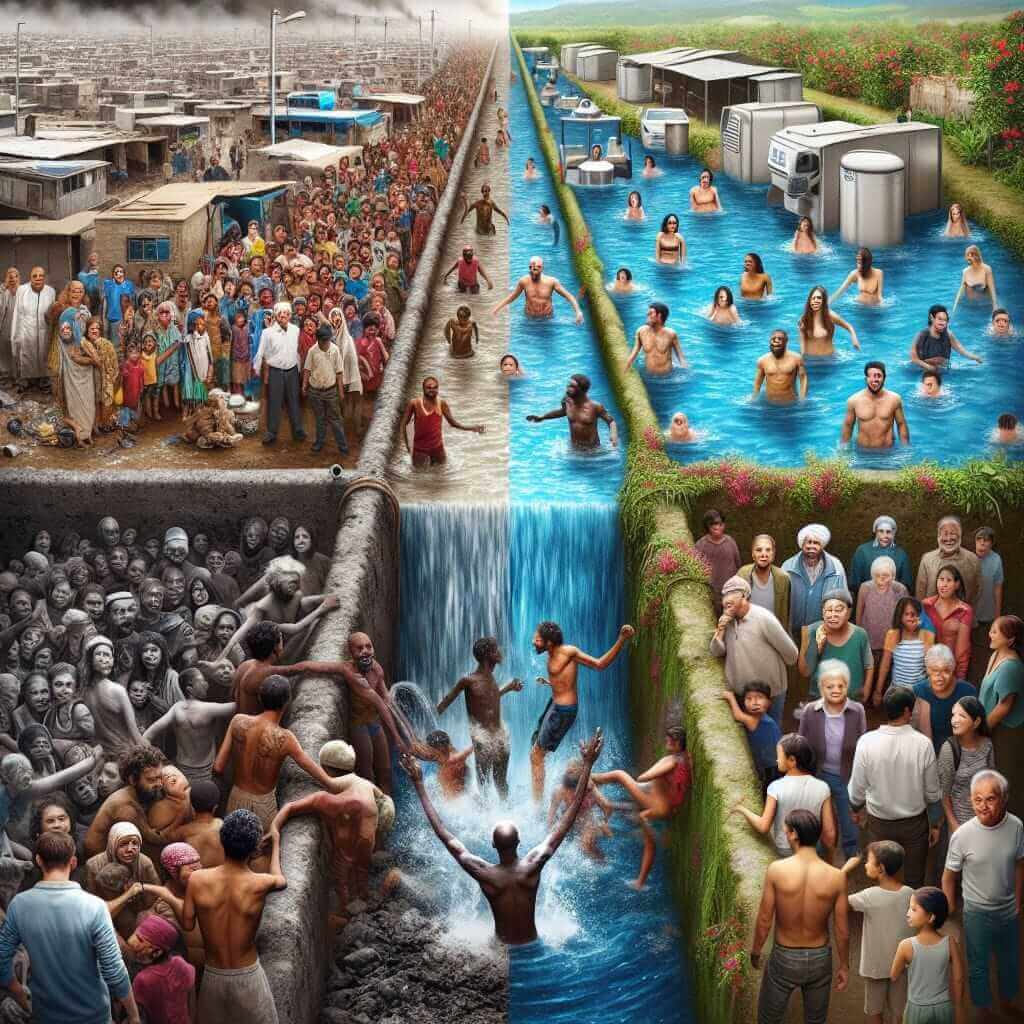Access to clean water is a fundamental human right and a critical factor in overall health and well-being. This topic frequently surfaces in IELTS Writing Task 2, often prompting discussions about its impact on public health, economic development, and environmental sustainability.
Nội dung bài viết
Here are some potential IELTS Writing Task 2 questions related to this topic:
- Some people believe that access to clean water is a fundamental human right, while others argue that it is a commodity that should be paid for like any other. Discuss both views and give your own opinion.
- What are the main challenges to providing clean water in developing countries, and what solutions can be implemented to overcome these challenges?
- The increasing global demand for water is putting a strain on resources. What measures can individuals and governments take to address this issue?
Sample Essay: Analyzing the Right to Clean Water
Let’s delve into a sample essay addressing the first question:
Some people believe that access to clean water is a fundamental human right, while others argue that it is a commodity that should be paid for like any other. Discuss both views and give your own opinion.
Essay Analysis
This question presents a classic “discuss both views” structure, requiring a balanced examination of two contrasting perspectives. You need to present arguments for both sides before providing your own well-reasoned opinion.
Model Essay
Access to clean water, essential for survival and human dignity, is a subject of ongoing debate. While some advocate for its recognition as a fundamental human right, others contend that it should be treated as a commodity subject to economic principles. This essay will explore both sides of the argument before presenting my own viewpoint.
Proponents of the “human right” perspective argue that water, like air, is indispensable for life. Denying access to this basic necessity due to economic constraints is deemed unethical and unjust. They highlight that the United Nations recognizes water and sanitation as human rights, emphasizing their importance for health, education, and economic opportunities. By ensuring universal access to clean water, societies can reduce waterborne diseases, improve sanitation, and foster social and economic development.
Conversely, those who view water as a commodity emphasize the economic realities of water management. They argue that treating water as a free resource leads to overconsumption and depletion. Implementing pricing mechanisms, they believe, encourages responsible usage, promotes conservation efforts, and provides necessary funds for infrastructure development and maintenance. They argue that private companies can contribute their expertise and resources to ensure efficient water management, ultimately benefiting consumers.

While acknowledging the economic considerations of water management, I firmly believe that access to clean water is a fundamental human right. The social, health, and economic benefits of universal access far outweigh the potential drawbacks of treating it solely as a commodity. Governments have a moral obligation to ensure equitable access to this precious resource, regardless of economic standing. By investing in water infrastructure, implementing sustainable water management practices, and promoting water conservation, we can strive towards a future where everyone has access to clean water. (Word Count: 285)
Writing Tips
- Clear Structure: Organize your essay logically, presenting both sides of the argument before stating your opinion.
- Supporting Evidence: Use relevant examples, statistics, or historical context to strengthen your arguments.
- Formal Language: Maintain a formal tone throughout your essay, avoiding colloquialisms or slang.
- Transition Words: Use appropriate transition words and phrases to ensure a smooth flow of ideas.
Vocabulary Enhancement
- Indispensable (adjective /ˌɪn.dɪˈspen.sə.bəl/): Absolutely necessary.
- Unethical (adjective /ʌnˈeθ.ɪ.kəl/): Not morally correct.
- Proponent (noun /prəˈpoʊ.nənt/): A person who supports an idea or course of action.
- Commodity (noun /kəˈmɑː.də.ti/): A raw material or primary agricultural product that can be bought and sold.
- Depletion (noun /dɪˈpliː.ʃən/): Reduction in the number or quantity of something.
Conclusion
Mastering the topic of “The importance of access to clean water” for IELTS Writing Task 2 involves understanding both the ethical and practical dimensions of the issue. By familiarizing yourself with relevant vocabulary, structuring your essays clearly, and supporting your arguments effectively, you can confidently address this pressing global concern in your IELTS exam. Remember to practice writing essays on similar topics to further enhance your writing skills and boost your confidence.